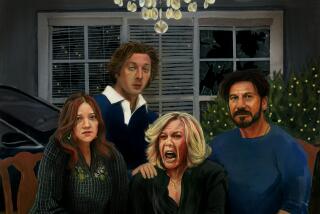Last Resorts <i> by Clare Boylan (Summit: $16.95; 250 pp.) </i>
“The worm turns” does well as a phrase, but as a film script it has its problems. How do you cast the leading part?
Clare Boylan’s novel about an easily put-upon woman who finally walks out, shares something of the difficulty. Her Harriet, a still-promising painter as she nears middle-age, has been abandoned by her husband, used as a sofa by a succession of lovers, and bullied by her teen-age children. She possesses warmth and humor; what she lacks is contours. She is an unbordered region of anxiety and swirling emotions, most of them entreaties for love.
“Last Resorts” is set on a Greek island where Harriet rents the kind of bare-bones cottage beloved of the thread-bare English intelligentsia. It is to be the stage for a Mediterranean idyll: brilliant sunshine, wine-dark sea, wine-dark wine, and “huge peaches, ripe and furry.”
Harriet’s three teen-agers are dragged along, occasionally indulgent but mostly sullen. Joe, her lover, married and an accountant, eventually arrives as well, nervously checking the ferry schedules.
The setting is pretty much all. Harriet has a script for the idyll--Joe is supposed to grow besotted and leave his wife, and the children are to frolic as a frieze of innocent fauns and nymphs--but the cast doesn’t measure up. The teen-agers retain their urban preoccupations and intrusive turbulences. For a while, Joe functions as great lover and much-needed disciplinarian. Then, alarmed at picking up a suntan--his wife thinks he is in Brighton--he flees abruptly to allow himself 10 days for paling.
Harriet’s need to propitiate is bottomless. As she scurries about her nightmarish vacation, the book comes to resemble the ballad about the maiden and the soldier:
“Soldier, soldier, won’t you marry me, with your musket, fife and drum?
“No, sweet maid, I cannot marry thee, for I have no coat to put on.
“So, up she went to her grandfather’s chest, and she fetched him a coat of the very, very best.
“And the soldier put it on.” And thus through cape, hat, sword, boots--the soldier demanding, the maid trotting upstairs--until, fully outfitted, he announces he’s married and is off.
“She could take almost anything so long as she was loved,” Boylan writes, adding these lines that dazzle in their horror:
“Other women flattered their lovers in bed with coarse language. She could not trust herself to say anything in case it was ‘Thank you.’ ”
Boylan, an Irish novelist, has not deprived her protagonist of a keen appreciation of her difficulties, and a wry tongue for expressing them. “In darker moods,” the book begins, “Harriet felt she had been placed by fate under a leak in the world.”
Importuned by the misery of her youngest daughter, Kitty, at finding herself too chesty for her bikini, Harriet lets her use her own elegant blue outfit. Not, however, without reflecting that “perhaps, having yielded her swimsuit she might now be expected to offer her breasts, like St. Agatha’s, on a plate.”
The unruliness of the children and Joe’s insistence upon orderliness place Harriet in a proverbial middle, for which she devises a berserk game-plan.
“She saw the answer as a game for six or seven players, in which she, leaping and scurrying and occasionally ducking, must make all the moves . . . The thought tired her but she calculated it as the price of love and she knew she had to pay.”
Later, after staying up all night cleaning up a monumental mess, she finds Joe fresh and ready for adventures. All she wants is to go to bed, though not for sex. “How often in the past had she gone to bed with men from sheer tiredness,” she reflects with a glimmering of awareness. “She was admired and feared for her directness. She developed a reputation.”
Harriet reveals herself through this mixture of foolishness and insight. Boylan has set her in a whirlpool and means to extricate her. But the book is mostly the whirlpool, and this creates problems.
For one thing, we get no steady or reliable view of Joe and the three children, or of various neighbors who come and go. They are all seen from Harriet’s own lurching perspective, and they go in and out of focus. From such a queasy vantage point, they are unable to provide much independent life to the book. It is all Harriet, and it is too much.
Boylan has portrayed her with lavish wit, judicious affection and no sentimentality. The difficulty lies in making certain that such a character, all spills and overlappings, keeps moving. When Harriet turns at the end, she has failed to pick up enough momentum to arouse much excitement about it. Her revolt has all the nautical dash of a soup tureen tacking.
More to Read
Sign up for The Wild
We’ll help you find the best places to hike, bike and run, as well as the perfect silent spots for meditation and yoga.
You may occasionally receive promotional content from the Los Angeles Times.






